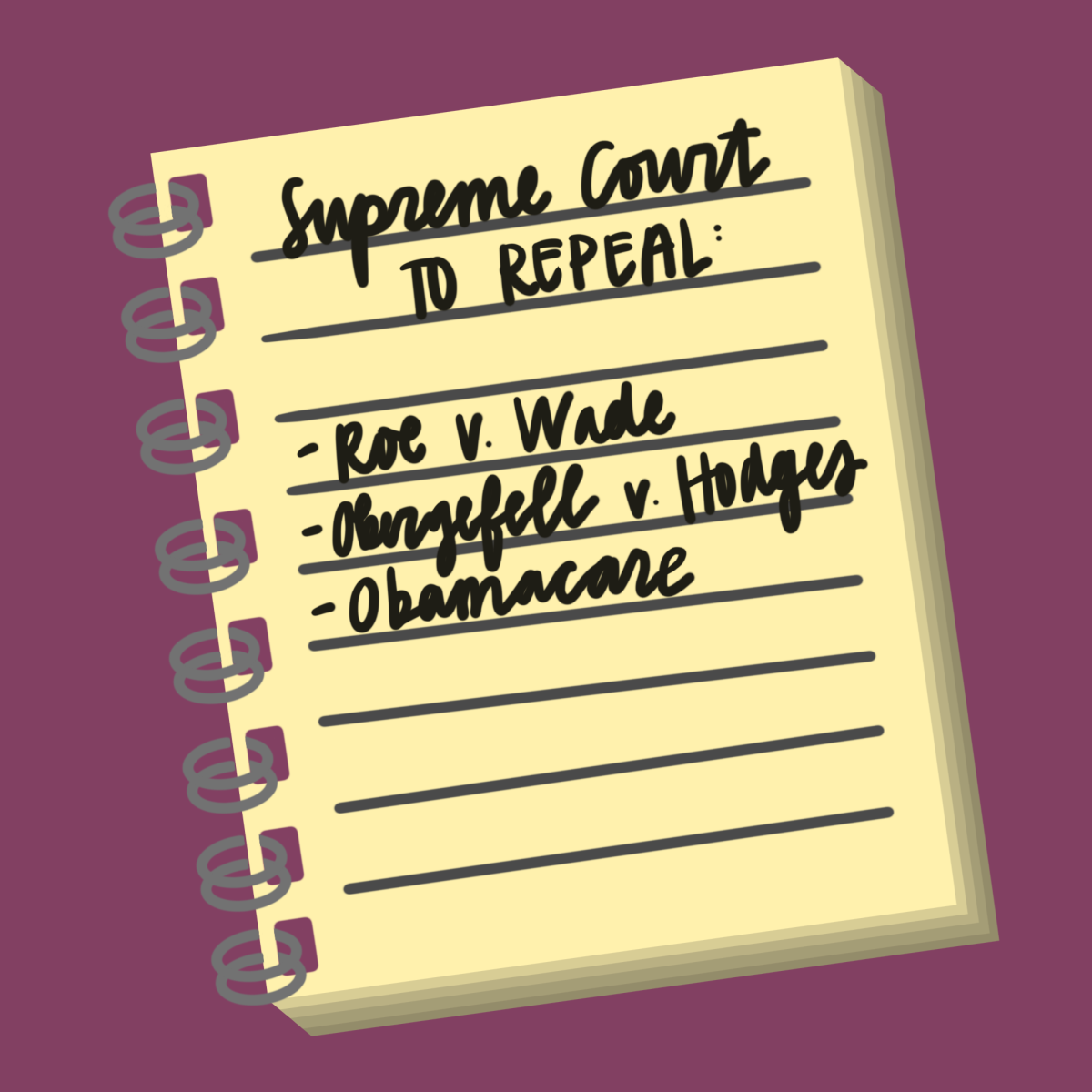Worry, anxiety and, for some students, hope is looming due to Amy Coney Barrett’s unprecedented and unethical entrance into the U.S. Supreme Court. With the appointment of yet another Catholic justice, the Court is now dominated by a conservative majority; this is absolutely terrifying.
From a student perspective, long-term birth control and access to STI testing sound more appealing than ever right now. College students should take preventative measures because no one can be quite sure what is to come.
For Katherine Hargrave, a special education junior, Barrett’s appointment brings anxiety regarding the Affordable Care Act (ACA) and the environment. With climate change in the U.S. becoming more concerning, the urgency to act upon the safekeeping of the environment grows.
“I’m not exactly stoked on her being confirmed for the [Supreme Court],” Hargrave said. “No other president has been allowed to do this so close to the election, nor am I a fan of her views. I’m not excited to see how she’s going to rule on the [Affordable Care Act] or anything relating to the environment.”
As for the ACA, it is relatively unknown how Barrett would rule on such a matter. Due to her previous writings, the speculation that she would rule unfavorably against affordable healthcare is not a baseless assumption.
Birth control, access to legal (and safe) abortions, STI testing and even gay marriage’s legality all become questionable with the ascension of Barrett into the most prestigious and important court in the nation. Her nomination came just weeks before a critical presidential election, pushed through and encouraged by the current president. The hypocritical move brought tensions across the U.S. to a boil.
For junior biology pre-med major Payton Morel, Barrett simply lacks the experience to rule, pushing aside the best interest and “representation for the majority of the people.”
“I can understand wanting a Republican [SCOTUS] judge that will most likely interpret the Constitution instead of using it as a guide,” Morel said. “However, I think the process was extremely rushed and a better representative could have been chosen.”
Reproductive rights are also at stake with the recent nomination. For some female Texas State students, Barrett is a threat to their rights — specifically, access to legal and safe abortions.
“I feel anxious about [Barrett] becoming the Supreme Court pick,” senior history major Kerry Furman said. “I believe she’d vote negatively on abortion rights cases [and] have a negative effect on healthcare in this country.”
Furman’s concerns are not without reason. Although the historical Roe v. Wade Supreme Court case may not be contested, easy access to the aforementioned healthcare necessities might become more difficult. Justices on the Court are expected to leave partisanship at home and “believe in the Constitution of the United States,” but it is hard to think Barrett, with her Catholic past, will act fairly while serving.
Earlier in the year, the Supreme Court was faced with a case regarding birth control access; specifically, how employers could deny the medication under “religious or moral objections.” That allows employers to complicate the process of seeking coverage for birth control.
“Birth control, abortions and other necessities have been under attack for years due to the Trump administration,” Furman said. “Now, there’s a real chance that his erosion of abortion law will have a real, negative impact on every woman in this country.”
Limiting access to reproductive health services can have drastic consequences—delaying the conversation regarding sex and sexual health is not a viable way to combat healthcare among college students. Limiting abortions and birth control access will not stop them from occurring — it will only stop them from being performed safely.
“Women’s rights have always been a threat,” Morel said. “Her being nominated has pushed a conservative bias into the court. The fear of not having access to birth control is prominent. Having a woman who refuses to announce any of her views before joining the court has caused a lot of fear in wondering what she will do in future cases.”
Barrett’s nomination and appointment could hurt progressive establishments in the nation; still, other students are hopeful for the future.
“Personally I think she’s going to be really conservative at the beginning,” senior computer science major Kian O’Ryan said. “But, whenever you look at the pattern of [Supreme Court Justices], they tend to start leaning more towards the left as time passes, which I think will be her own saving grace once 10, 15, 20 years pass. In a few years, she might be a bit more on the left, but at the same time I feel like if she had any integrity, she should have honestly refused the nomination.”
O’Ryan reflects on Merrick Garland, who was previously President Obama’s nominee for the Supreme Court vacancy in 2016. With late Justice Antonin Scalia’s death, the situation with Barrett almost mirrors that of 2016 — however, in this case, Barrett was able to be rushed into the court.
It is unclear where Barrett would stand regarding cases about abortion, birth control and reproductive rights, but her nomination could be a large wrench in the process toward progressive sexual healthcare. Access to birth control is not solely for sexual health—in fact, birth control has a multitude of other benefits.
“I think [Barrett’s nomination] is going to definitely set us back, maybe,” O’Ryan said. “I don’t think it’s going to be as bad [as people think]. I don’t think anything bad is going to happen with gay marriage. Abortion, maybe, but gay marriage, I want to say is pretty safe because that seems like something that as a country we have decided that being gay is okay. It’s a topic a lot of politicians don’t want to touch.”
Barrett’s nomination came at a time of tension in the U.S. With a historical election currently taking place and a multitude of progressive ideas being challenged, the idea of having that progress set back drastically is gut-wrenching—the rights of college students to access adequate healthcare should never be at stake.
No human rights should be questioned, and access to quality healthcare should be a right.
– Valeria Torrealba is a public relations junior
The University Star welcomes Letters to the Editor from its readers. All submissions are reviewed and considered by the Editor-in-Chief and Opinion Editor for publication. Not all letters are guaranteed for publication.
Opinion: Amy Coney Barrett’s appointment is terrifying for reproductive rights
November 22, 2020
Donate to The University Star
Your donation will support the student journalists of Texas State University. Your contribution will allow us to purchase equipment and cover our annual website hosting costs.

























